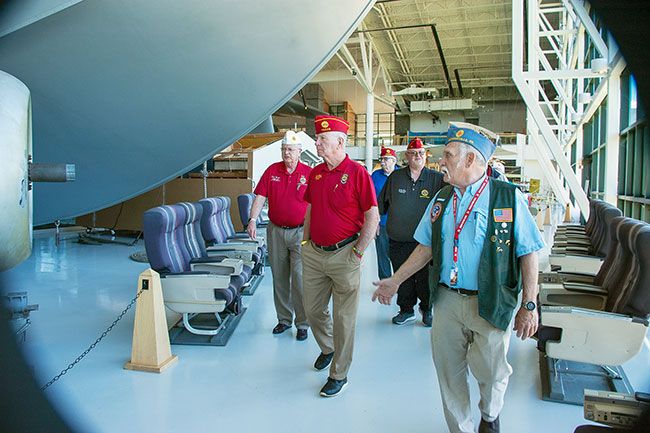National commander visits local Legion

Local American Legion members welcomed their national commander June 28, giving him a tour of the Evergreen Aviation and Space Museums as well as the McMinnville, Sheridan and Carlton Legion posts.
“It’s pretty special to have a national commander visit,” said Walt Fulcher of Carlton Memorial Post 173. “It’s a great chance for a lot of our members to meet him.”
National Commander Paul Dillard of Texas was in Oregon for only a few days. He said he was pleased to meet Yamhill County Legion members, including members of the Legion Riders motorcycle organization from McMinnville and Newberg.
The Riders escorted him from place to place.
Dillard and his entourage, which included state Legion officials, started the day at the air museum with a cockpit tour of the Spruce Goose. Then they toured other exhibits, from a reproduction of the Wright Flyer to war planes such as a Vietnam Era A-4 fighter jet.
The commander said he enjoyed the museum and the whole trip. “I’ve met a lot of great folks,” he said.
Dillard stopped for lunch at McMinnville Post 21 with local Commander Juan Palacios, Auxiliary State President Debra Godwin and other members of Legion organizations Then he followed the Legion Riders to Sheridan, and on to Carlton.
At the latter post, he helped Fulcher present an honorary award to 75-year Legion member Alvin Tesky.
Tesky joined the Legion after serving in World War II as an Army engineer. He said he spent most of his service time in the South Pacific building things such as quonset huts for troops.
The South Dakota native came to Oregon after the war. He joined the Newberg Legion Post first, then transferred to the Carlton one — which, incidentally, meets in a quonset hut similar to those Tesky built in The Philippines.
Dillard spoke with Legion members at each stop. He said he was interested in their projects and efforts to grow their membership.
The Texan even took time to tease members. “I served in the REAL military, the U.S. Navy,” he boasted to the Army, Marine and Air Force veterans in the room.
It’s OK to say things like that, if you’re a vet, Dillard said. “We kid each other, but we’re all good men,” he said. “It’s all about camaraderie.”
Camaraderie lies at the heart of Dillard’s project for his year in office. In an effort to reduce the high suicide rate among veterans, he is promoting the “Buddy Check” project.
It’s not just about Legion members, he said; it’s about all vets. “No veteran left behind,” he said.
Twenty to 22 veterans kill themselves every day, Dillard said. The isolation of the last two years has only increased the program.
But the number may be reduced by buddy checks: vets calling each other to ask how things are going.
“The chances are, if they’re thinking of suicide, they’ll tell you and you can get them help,” he said. “Every vet should have 10 or 12 names in their pocket that they call regularly.”
The Legion also is backing a National Buddy Check bill that’s being considered by Congress.
It would raise awareness of suicide prevention and the importance of people checking on each other, he said. In addition, it would include some money for grants that would help train vets how to talk with those who are feeling suicidal.
Dillard encourages vets who are feeling depressed, lonely, anxious or lost to call a national suicide prevention number, 1-800-273-8255.











Comments